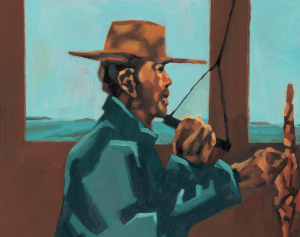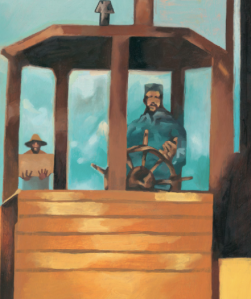![]() Everyone knows Frederick Douglass and Martin Luther King, Jr., but there are many other African Americans who have contributed to the rich fabric of our country but whose names have fallen through the cracks of history.
Everyone knows Frederick Douglass and Martin Luther King, Jr., but there are many other African Americans who have contributed to the rich fabric of our country but whose names have fallen through the cracks of history.
We’ve asked some of our authors who chose to write biographies of these talented leaders why we should remember them. We’ll feature their answers throughout Black History Month.
Today, Janet Halfmann shares why she wrote about Robert Smalls in Seven Miles to Freedom:
I was inspired to write about Robert Smalls because he played a very important part in the Civil War, but his role has received little recognition. He showed exceptional bravery, skill, and intelligence in stealing a gunboat from right under the eyes of the Confederates and sailing it through South Carolina’s Charleston Harbor to Union lines. I felt he was a great role model for anyone facing challenges. Also, I was riveted by his heart-thumping escape, and I thought kids would be, too. It was a great adventure story, just waiting to be told.
Robert Smalls and countless other African-Americans played important roles in helping to win the Civil War. In the past, not many of these stories have been included in history books. I feel it’s important for all Americans, and especially for African-American children, that the entire story be told. All children need role models that look like them.
Robert Smalls’ achievements deserve recognition for many reasons. During slavery, many people considered blacks incapable of ever measuring up to whites. Robert Smalls’ bravery and intelligence helped to prove this idea wrong. Robert Smalls was so popular after his escape that Union military officers in South Carolina sent him North to speak and raise money for the many newly freed men, women, and children streaming into Union camps. He also met with President Lincoln and helped to convince him to let African-Americans enlist in the Union army.
After Robert Smalls’ escape to freedom, he had a distinguished career as a civilian ship pilot for the Union. He was the first African-American named a captain of a United States ship. After the war, he helped write a new state constitution, which included his proposal for the creation of South Carolina’s first free system of public schools for all children. He went on to serve five terms in Congress, working for equal rights for all people. Robert Smalls was so popular in his hometown that he was called the “King of Beaufort County.”
Want to win a copy of Seven Miles to Freedom? Enter our Black History Month book giveaway.











